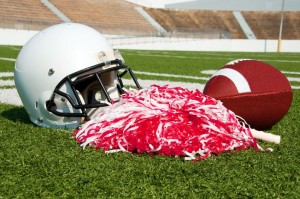Cheering for Fair Pay: NFL Cheerleaders and Workers’ Rights

A new season of football has begun, but even those who lack interest in the sport are aware that the National Football League is struggling amidst cheating scandals, domestic violence cases, and increasing instances of brain disease—often resulting in tragic ends for some of our most beloved players. Now the latest problem affects women—specifically, NFL cheerleaders and their right to fair pay.
Over the past year, former and current NFL cheerleaders filed lawsuits against their respective teams for violating labor laws. According to BuzzFeed, the cheerleaders “are classified as ‘independent contractors,’ which allows teams to avoid paying minimum wage” and avoid providing basic employee benefits. Though some states like California have introduced or already passed minimum-wage laws as a result of the lawsuits, lawmakers in eight other states want to make it league policy; last week they sent a letter to NFL Commissioner Roger Goodell, urging him to classify cheerleaders as employees.
There is no doubt that being an NFL cheerleader involves work: hours of practicing routines, performing at the games, rigorous fitness regimes, and achieving that perfectly polished look through expensive hairstyling and makeup. TIME magazine reported that one lawsuit filed by a former Oakland Raiders cheerleader revealed that, despite 300 hours of work time in an NFL season, her resulting pay came to less than $2.85 an hour. Fitness and cosmetic expenses, despite arguably being a necessary part of the job, were paid for by the cheerleaders themselves.
But it gets worse. An op-ed published in the New York Times last Friday stated:
Testifying recently in the California Assembly, Caitlin Yates, a former Raiderette, said that cheerleaders were benched without pay if they gained weight, and forced into situations where they were sexually harassed. In their lawsuit, the Buffalo Bills’ cheerleaders allege that they had to walk around in bikinis at a casino event called “The Man Show” to promote the team, and at a local golf tournament men bid on which cheerleaders would ride in their golf carts.
It’s easy to dismiss the need for cheerleaders altogether. While some argue that struggling sports teams lacking a dedicated fan base need an upbeat squad of women to give their team motivational boosts, in today’s NFL even the historically terrible Cleveland Browns have plenty of fans cheering them on at home games. But the necessity of cheerleaders shouldn’t matter—after all, do we even need football itself?
As a feminist, I support any and all job opportunities for women in the NFL, from cheerleader to team owner. On the plus side, big changes are already happening: Sarah Thomas became the first full-time female referee in NFL history when she served as line judge for the Patriots-Giants preseason game on September 3. And though she was disappointingly not hired full-time, Jen Welter was the first woman to intern as an assistant linebacker coach for the Arizona Cardinals during training camp this past summer.
The NFL is a multi-billion dollar industry, and it’s not going away anytime soon. If the league wants more women watching football—and to show support for the 45 percent of their fan base who are women—it can start with making sure all its employees are paid for their work. After the many bad decisions Goodell has made during his tenure as commissioner, the decision to give NFL cheerleaders minimum wage should be relatively simple and handled swiftly.
